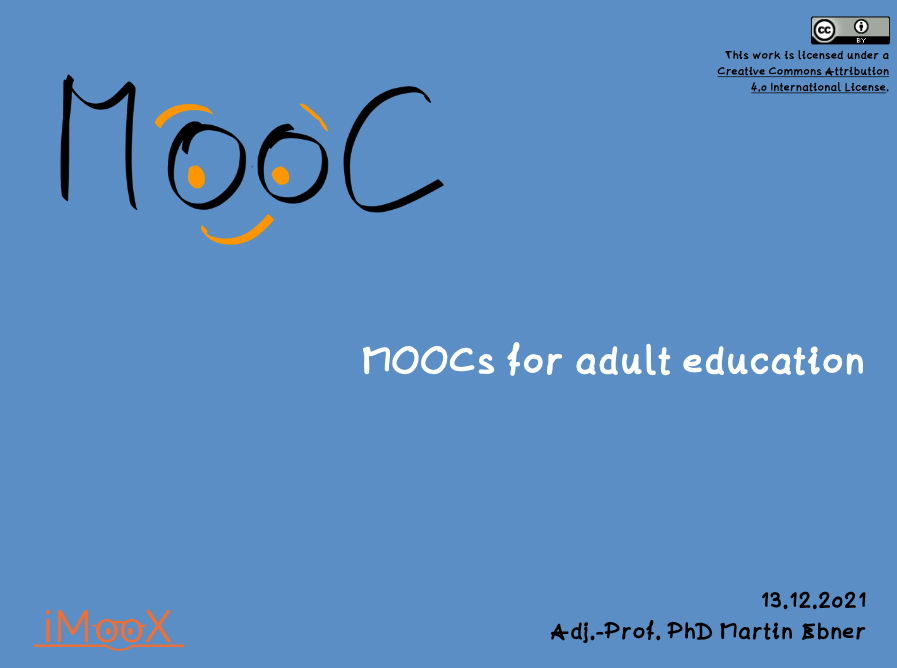I am happy that I can share the slides of my talk about „MOOCs for adult education“for the DISTANCE EDUCATION CONFERENCE on LIFELONG LEARNING last year in Istanbul, Turkey:


Digitale Lehre an und rund um der Technischen Universität Graz
Es freut uns, dass heute ein weiterer MOOC der TU Graz auf iMooX.at startet: „ElectrONiX – Amplifiers“ und zwar in insgesamt 4 Sprachen:
In diesem MOOC werden die grundlegenden Eigenschaften von Dioden und unterschiedlichen Transistortypen, sowie deren Einsatz in verschiedenen Verstärkerschaltungen behandelt. Ziel dabei ist es sowohl das mathematische Werkzeug, als auch das praktische Verständnis zu vermitteln um Verstärkerschaltungen selbstständig dimensionieren zu können. Dazu stehen viele Rechen-, Simulations- und Praxisbeipsiele zur Verfügung um am Ende des Kurses einen einfachen Audioverstärker aufbauen zu können, sowie umfassende Kenntnisse über Funktion und Einsatz von Operationsverstärkern zu erlangen.
Die Teilnahme ist wie immer kostenlos: [Anmeldung zur kostenlosen Teilnahme]
Wir haben wiedermal eine App programmiert, die unsere IdeRBlog-Projekt unterstützt – wer dabei ist, sollte sie jedenfalls ausprobieren:
Hallo, schön, dass Du dich für IDeRBlog interessierst. Um die App benutzen zu können, muss Dein Lehrer einen Account für Dich anlegen. Wenn Deine Schule noch nicht beim IDeRBlog Projekt mitmacht, kannst sich Dein Lehrer auf IDeRBlog.eu informieren.
Ich darf auf einen neuen Call for Papers zu „Massive Open Online Courses und ihre Rolle in der digitalen (Hochschul-)Lehre“ hinweisen für die Zeitschrift für Hochschulentwicklung (ZFHE). Wir würden uns sehr über Beiträge freuen:
In diesem Call rufen wir auf, das Thema Massive Open Online Courses insbesondere im deutschsprachigen Raum aus allen Perspektiven zu betrachten. Folgende Fragen können als Anregungen genommen werden, sind aber keinesfalls vollständig:
Die Deadline für Einreichungen ist der 28.10.2022 -> hier geht es zum Call for Papers.
David Ofner hat sich im Rahmen seiner Bachelorarbeit mit guten Lernvideos für den Deutschunterricht der Sekundarstufe I beschäftigt und dabei viele Videos recherchiert. Diese möchten wir hier als Liste zur Verfügung stellen, weil wir denken, dass es generell hilfreich ist. Leider sind nicht alle Videos OER, aber zumindest frei zugänglich und verwendbar.
Anna hat ihre Masterarbeit zu „Empfehlungen für den Unterricht im Fach Informatik für Menschen mit Autismus-Spektrum-Störungen“ verfasst. Hier noch die Folien ihrer Verteidigung:
Klicken Sie auf den unteren Button, um den Inhalt von www.slideshare.net zu laden.
Wir freuen uns, dass heute ein weiterer MOOC zu „Demenz.Aktivgemeinde“ auf iMooX.at startet:
Demenz.Aktivgemeinde lädt Menschen mit Demenz und deren An-und Zugehörige in die Mitte der Gesellschaft ein. Damit wollen wir der Stigmatisierung dieser Erkrankung entgegenwirken. Mit der Absolvierung dieser Online-Schulungen können auch Sie einen Beitrag dazu leisten, Menschen mit Demenz in unsere Mitte zu holen. Denn: Wissen.Schafft.Sicherheit auch im Umgang mit Menschen mit Demenz.
Wie immer ist der Kurs kostenlos und man kann sicher jederzeit anmelden: [Kostenlose Anmeldung zum Kurs]
Here are the slides of my keynote talk about „Game based Learning & Gamification in (Higher) Education“ at 2. FHGR Gamification & Serious Games Event in Graubünden (Switzerland):
Nach der erfolgreichen MOOC „Tenses explained“ startet auf iMooX.at der Nachfolge-MOOC mit dem Titel „writing explained„:
Nach erfolgreicher Absolvierung des Kurses sollen die Teilnehmer:innen in der Lage sein, die Grundzüge der im Kurs behandelten Textsorten situationsgerecht anzuwenden. Und zwar geht es um Informal E-Mail, Formal E-Mail und Essay.
Natürlich ist die Teilnahme kostenlos: [Link zur kostenlosen Anmeldung]
Im Rahmen unseres Learninglab ist wieder eine mobile Applikation für Kinder im Rahmen einer Qualifikationsarbeit entstanden – ein Mulitplikationstrainer:
Expand your multiplication skills.
You can start a short game over ten rounds or an online game.If you reach enough points at the short game, you unlock the next level with higher complexity. Or our Online-System creates your multiplications. The system enables you to see your calculations and errors online.
So you are able to analyze your errors and improve your skills. If you play the online mode, you need an account from the learning lab of the TU Graz.